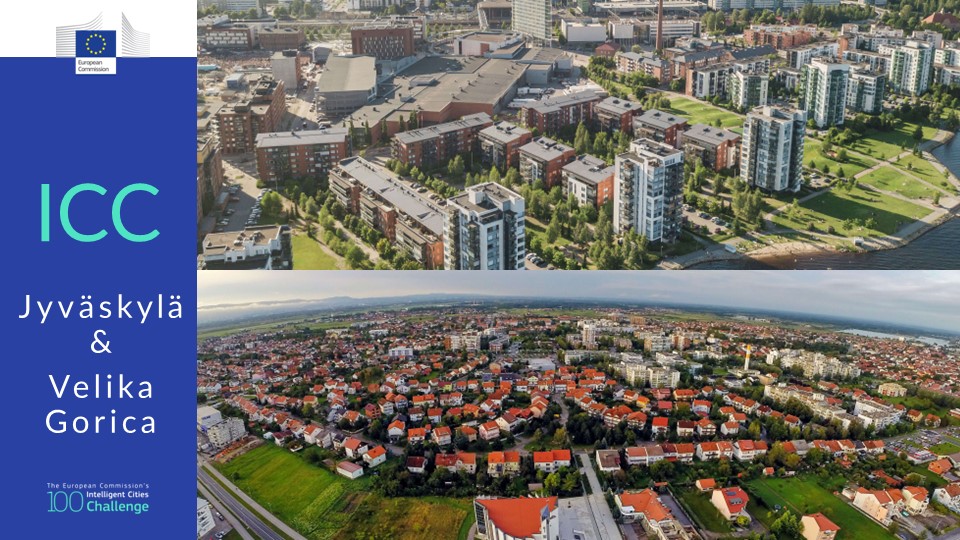
Being the largest cities in their respective regions, is just one point in common that the cities of Jyväskylä and Velika Gorica share. The Intelligent Cities Challenge (ICC) discovered this by talking to them about the projects they developed within the ICC, which revolved around the Green economy and local green deals thematic track.
Jyväskylä is a city located in Central Finland in the Lakeland area. Jyväskylä is the largest city in Finnish Lakeland and is one of the fastest-growing cities in Finland during the 20th century. As a result of this fast growth, the city had to adapt quickly and develop sustainable solutions. Meanwhile, Velika Gorica is the 6th largest city in Croatia and is the largest city in Zagreb County. Velika Gorica is aiming to create comprehensive approaches to developing, initiating and implementing a smart city.
A reflection on the heating system of the city
Gordana Mikulčić Krnjaja, Head of the Department for Urbanism and Environmental Protection, explained that the city of Velika Gorica decided to focus on the decarbonisation of the city after assessing the quality of the air. To do so they decided to gather information about the heating method chosen by households. This database, completed through a survey sent to the citizens, helped the city to understand the source of the carbonisation in the city. Whilst the database will have to be completed further to represent the entirety of the city, it is already revealing that the main source of heating is wood.
An open data portal to the service of the green transition
Following the creation of this database, the city of Velika Gorica decided to work on an open data portal to give unique access to this data to citizens and companies. The available data will be of different natures but will help citizens and businesses to assess their consumption and help them in their green transition. For instance, as the Municipality is installing solar panels on the rooftops of 22 buildings, the open data portal will be helpful to check the amount of energy created and consumed by the buildings. Ultimately this will help the Municipality to understand the impact of solar panels on the energy mix.
A carbon neutral objective by 2030
Nicholas Marsh, EU Project Coordinator, detailed the city’s focus on the decarbonisation of Jyväskylä’s municipality with an additional challenge regarding the objective of being carbon neutral by 2030. Being part of the ICC helped the city of Jyväskylä to clearly set its objectives and to boost capacity building in the domain of green transition. Within the ICC, the Municipality detailed 3 main ambitions:
- Establishing a Research Development and Innovation centre
The Research, Development and Innovation (RDI) centre, which is still in development, will act as a bridge between universities and the private sector.
The first step towards the development of the Research, Development and Innovation centre was taken with the creation of the RDI docking platform which is an interface for universities and businesses to exchange best practices and key information regarding the green transition. This docking platform will also serve to further specify what the actual RDI centre will look like and if it will be a physical or digital place.
- Developing understanding and competencies amongst businesses
In order to develop the collaboration between businesses and upskilling, the municipality of Jyväskylä developed a network that connects all local and existing networks. This network is also used to connect students and staff of higher institutions to pass on knowledge about the green or digital transition to businesses that have trouble finding correct information regarding these topics.
- Mainstreaming and profiling responsible businesses amongst different organisations
To complete this objective, the Municipality also developed a collaborative network between businesses with a focus on a sustainable approach. With exchanges of best practices to improve our everyday life from a responsible perspective for example.
Both the cities are delighted with their participation in the Intelligent Cities Challenge mainly because it pushes them to clearly structure their needs and goals. The collaboration with other cities on an international level and with different institutions was also a very positive point as it helps cities to understand and identify pain points. Finally, for the cities of Velika Gorica and Jyväskylä, the ICC represents a great way to accelerate projects.
The ICC congratulates the two cities for their hard work and looks forward to seeing the final implementation of the different projects.


